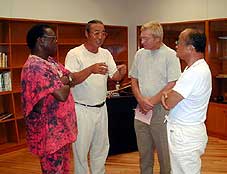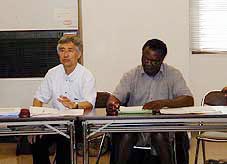INTERNATIONAL FOLK HIGH SCHOOL
THE MANDELA PROGRAMMEへの案内

YIGA NGユOKOLA FOLK INSTITUTE, MBALE AND
ASSOCIATION FOR WORLD EDUCATION (Uganda Chapter)
WHO ARE THE ORGANISERS?
AFRIKA STUDY CENTRE was established in 1994 as an educational Trust to study and carry out research on African civilisations, African Societies and African Cultures and to disseminate the results of such studies and research. Currently the Centre is engaged in research on the transformation of agro-pastoralist violence and conflicts as well as student exchange programme between Tomelilla Folk High School in Sweden and Uganda.
YIGA NGユOKOLA FOLK INSTITUTE was established in 1994 as a non-governmental organisation to assist the strengthening of grassroots and community based groups in self-management on the basis of training, exchange of experiences and dialogue. Currently 30 Women and Youth Community-Based Groups in seven districts of Uganda run it on a democratic basis. Its programmes are concerned with the problems of survival of rural communities.
ASSOCIATION FOR WORLD EDUCATION was established in 1970 in Denmark with the vision of promoting world education. It is an international, non-governmental, voluntary organisation of individuals and institutions who believe that learning about our selves and our communities is most effective and satisfying when education reflects an awareness of our intimate relationship to the world as a whole. The Uganda National Chapter was formed in 1996 following the 25 Anniversary of the Association, which was held in Helsingソr, Denmark immediately after the Social Summit. Since then it is working on an action research programme on the problems of pastoralist communities which is now moving into the stage of community dialogues and community-based peace initiatives.
WHO IS PETER MANNICHE?
Peter Manniche (1889-1981) was a follower of Bishop Nikolai Grundtvig, the famous Danish educational philosopher and father of the Danish Folk High School Movement. This movement began in 1844 with the building of the first folk high school in Denmark in that year.
Grundtvig believed that the common people were not only capable of cultural education, but that such culture was essential if they were to play a responsible part in their communities and the nation. He stressed the need to learn in fellowship with the others through the mother tongue and through メthe living worldモ. This is what he called `folklighedユ ミ a Danish concept translated by Peter Manniche to mean メcommunity life that embraces everyoneモ.
Peter Manniche founded the International Peoples College at Helsingソr, Denmark in 1921 to meet the needs, which arose after World War One as part of the desire to promote peace among all peoples, religions, races and nations. The establishment of the College also met the demands for a wider education for industrial workers in the western countries, which became significant at this time.
Peter Manniche had three objectives in building the College along the traditions of the Danish Folk High School. The first was to found a community where students from all over the world could live and work together to promote international understanding and peace. Secondly, through these means he wanted to bring about better relationships between different classes in society. Thirdly, he wanted to foster a greater insight into the understanding of spiritual values in the tradition of Bishop Grundtvig and Christian Kield (one of his followers who founded one of the first Folk High Schools in Denmark).
Throughout its history of over 80 years, the International Peoples College has brought together students from all over the world to study together and work towards the realisation of the Peter Mannicheユs ideals. When many countries of Asia, Africa and Latin America gained their independence, Manniche tried to expand the idea of the College to the problems of these newly independent countries and apply the Danish Social Experiment to problems of development. This College, which was called the Rural Development College, was established at Holte in Denmark in 1964, but it was closed in 1973 in order to transfer the functions of the College to developing countries themselves.
WHAT IS THE PETER MANNICHE IINTERNATIONAL FOLK HIGH SCHOOL?
The Peter Manniche International Folk High School is being founded on an informal basis in memory of Bishop Grundtvig and his follower Peter Manniche in promoting a people-inspired, people-based and people-run form of education based on humanistic values and principles which has spread to other parts of the World.
The three sponsoring organisations mentioned above, believe that the twenty-first century is a learning century through which humanity will build a culture of peace, freedom, and a holistic development. They believe that a culture of peace can only come about through cross-cultural communication, and cross-cultural learning and understanding which the tradition of the folk high school makes possible.
Through cross-cultural learning, Grundtvigユs idea of ヤfolklighedユ is now being integrated with other humanistic educational ideas into global folklighed ミ meaning a global community life that embraces everyone in the world. Through cross-cultural communication and learning, all humanistic traditions are converging into a unity of cultures.
Nelson Madiba Mandela has added insight into this process by calling for an African rebirth and regeneration on the basis of Ubuntu-a philosophy of common humanity. He has called for human reconciliation and justice for all racial, religious and ethnic communities in South Africa. The idea of Ubuntu combines beautifully with Grundtvig-Manniche philosophies and their convergence promotes international understanding, which lead to a global Ubuntu, i.e.-a global humanness in community of peoples of the 21st Century.
THE MANDELA PROGRAMME 2001
The first Peter Manniche International Folk High School, Mandela Programme will be held at Afrika Study Centre, which is located at Mbale in Eastern Uganda. It is hoped that this will be a yearly event, which will be held in the first two weeks of August of every year. It is further hoped that eventually, the events will develop into a fully fledged and structured international folk high school which will be located in Uganda.
This year, the event will take place between 5th and 18th August 2001. The main objective of the School this year will be to focus on agro-pastoralist communities of North Eastern Uganda. The course will look at the problems of these communities and the way they are involved in trying to find solutions to them.
The sponsoring organisations have some experiences in dealing with these communities and are involved in grassroots community activities as well as in participatory action research involving the communities. These experiences will be presented to the participants for information, discussions and reflections. The presentations will be in the form of short lectures, followed by discussions and reflections. There will also be testimonies from members of the communities about their own activities and experiences who will be invited for the purpose.
There will in addition be cultural activities such as singing, dancing, traditional sports, story telling, proverb interpretations and philosophical reflections on the purpose of life. The idea will be to enable participants to engage in cross-cultural exchanges and cross-philosophical reflections arising from different worldviews of the participants.
Participants should therefore come prepared to make cultural contributions. This will mainly be in the evenings. Participants will also be encouraged to prepare their favourite national dishes for diners so they can share culture through these means.

AWE唐津セミナーで報告するDani
TENTATIVE PROGRAMME
5th August 2001 - Arrivals and Registration.
6th August 2001 - Morning Session: Welcome and Introductions.
Afternoon Session: Introduction to the Programme.
Evening Session: Cultural Activities.
7th August 2001 - 9:00AM-10:30AM: Lecture: Participatory Action
Research as a Method by Prof. D.W. Nabudere.
11:00AM-12:30PM: Lecture: The AWE Research Project on Agro-pastoralist Conflicts by Paulo Wangoola.
12:30PM-14:30PM: LUNCH BREAK
14:30PM-16:30PM: Group Discussions
17:00PM-19:00PM: Cultural Activity
8th August 2001: 9.00am-10.30pm: Lecture: Women in agro-pastoralist communities by a Woman Leader from the Communities.
-Discussions
11.00am-12.30pm: Lecture: The Elderly and the Children in pastoralist communities.
-Discussions
12.30pm-14.30pm: LUNCH BREAK
14.30pm-16.00pm: Group Work
9th August 2001: Whole Day: Crafts and pottery
10th August 2001: 9.00am-10.30pm: Lecture: Cattle in the Lives of the pastoralist communities.
11.00am-12.30pm: Group Work
12.30pm-14.30pm: LUNCH BREAK
14.30pm-16.00pm: Reflection: Culture in pastoralist communities: This will be done in groups with representatives from different pastoralist cultures.
11th August 2001: Whole Day: Excursion
12th August 2001: FREE SUNDAY
13th August 2001: 9.00am-10.30pm: Lecture: Folkelighed and Ubuntu
A comparative analysis of Danish and African learning experiences.
Prof. Dani W. Nabudere
11.00am-12.30pm: Discussions in Groups
12.30pm-14.30pm: LUNCH BREAK
14.30pm-16.00pm: Group Work continued: Educational philosophies from different cultures represented.
14th August 2001: VISIT TO A PASTORALIST COMMUNITY- Whole Day.
15th August 2001: Morning Session: Discussion of the experiences with the pastoralist community.
12.30pm-14.30pm: LUNCH BREAK
14.30pm- 17pm: Handicrafts
16th August 2001: 9.00am-10.30pm: The AWE Plan of Action in pastoralist Communities
11.00pm-12.30pm: Discussion of the programme
12.30pm-14.30pm: LUNCH BREAK
14.30pm-17.00pm: Handicrafts
17th August 2001: FREE SUNDAY AND WINDING UP
18th August 2001: DEPARTURES
FINANCES
As a goodwill gesture to the participants in the first course, tuition and programme activities will be FREE. Accommodation will also be FREE this year. Participants will however pay US $ 10 per day per person for meals and teas-that is US $ 140 per person for the two weeks. In addition, each participant will pay US$ 60 for logistics such as outings and excursions organised by the Centre.
For participants from the Eastern African region who may find it difficult to pay some of the expenses, a small scholarship scheme (to which others are free to contribute) will be available and applications for support should be received by June 2001.
PARTICIPANTS
So far, participants from the following countries have indicated interest:
Brazil 2
USA 1
UK 2
Denmark 5
Sweden 2
Japan 2
Korea 1
Sudan 5
Kenya 5
Uganda 5
Ethiopia 3
South Africa 1
DISCOVER UGANDA
For those interested in visiting places of interest in Uganda and East Africa generally, there will be tourist materials available during the course for participants to consult. In Uganda, participants might be interested in visiting the Source of the Nile at Jinja, Bujagali Falls and the Electricity Dam near Jinja. In the West, there is Lake Bunyonyi where you can watch birds and a gorilla national park. In the North, there is Paraa National Park near Murchison Falls on the River Nile where you can see crocodiles.